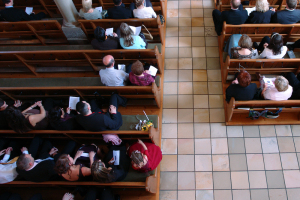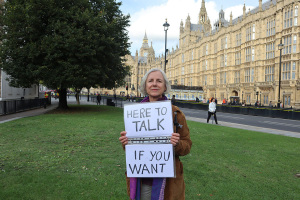Pastors explain why Christians should tithe, reject 'sow your seed' preaching

Tithing is not a popular practice among U.S. Christians and some pastors believe the church hasn’t done the best job in relaying the significance of giving a tenth of one’s income.
“We’re not talking about it in the right way. When the church has talked about money, it’s in a guilt thing or obligation, and it is very much in a transactional way — do this and God will do that,” Glen Packiam, lead pastor of New Life Downtown in Colorado, said in a recent podcast.
Daniel Grothe, associate senior pastor of New Life Church, knows all too well the message on tithing many pastors give: “Sow your seed so you can reap your harvest.” Grothe grew up in Tulsa, Oklahoma, which he labeled the “word of faith” capital of the universe.
The problem with these messages is that they make it all about “you” and not about the community.
“This is not about you and Jesus being OK. This is about God blessing us to make us a blessing because whether or not you’re struggling, someone out there is struggling and if we will pool our strength, if we will be the church, there will be single moms and their little kids rejoicing because of it,” said Grothe.
Though 83 percent of churchgoers believe tithing is a biblical command that still applies today, only 54 percent of those who attend church at least once a month say they tithe, according to LifeWay Research.
It’s fair to say that many people are hesitant to give and skeptical of the local church “because they’ve seen so much mismanagement of money,” Packiam acknowledged. “They’ve seen pastors … padding their own bank accounts; they’re not helping the poor.
“So in some ways we have earned the distrust of our own community. But we can earn it back by reminding them of the mission, by having a bit of transparency … [and] accountability.”
Money given to the church is supposed to help fill the needs of the community, the Colorado pastors maintained.
New Life Senior Pastor Brady Boyd believes if every member of his church tithed, he would be able to “solve the homeless single mom problem in El Paso County.”
“People [are] withholding their money … at the detriment of people right here in the city who are sleeping in their car,” he said. “There are people in our city who will suffer tonight because the church is not equipped and not resourced enough to meet the need.”
The Colorado pastors pointed to the example of the early believers in the book of Acts to demonstrate the impact of giving to the church.
Acts 4:32-35 states: “All the believers were one in heart and mind. No one claimed that any of their possessions was their own, but they shared everything they had. With great power the apostles continued to testify to the resurrection of the Lord Jesus. And God’s grace was so powerfully at work in them all that there were no needy persons among them. For from time to time those who owned land or houses sold them, brought the money from the sales and put it at the apostles’ feet, and it was distributed to anyone who had need.”
The early Christians showed a “radical” or even “dangerous” generosity that resulted in “no needy persons among them,” Grothe emphasized.
“You don’t get the sense that after Jesus, once the church is established that tithing goes away. You get the sense that it’s heightened, that people start living recklessly generous, trusting their Father in Heaven.”
Generosity is part of the Christian DNA because of who God is, Grothe suggested. God gave His son and His son gave His own life and Christians are made in His image.
While giving helps people to connect with the rest of the community, the pastors noted a pattern in which the wealthy become more distant and less likely to tithe as they move into better neighborhoods and lose contact with and compassion for those less fortunate.
“Poor people who are living among poor people realize the power of the church and that’s why tithing, the percentage of giving is really high among poor people because they’ve tasted and seen firsthand the power of the church in their lives,” said Boyd. “The richer we get, the less connected we get … with the poor; that’s why tithing keeps us connected to the plight of the poor.”
Stripped down to its basics, tithing is an act of worship to God, it’s a form of surrendering to Him. “It’s a representative gift that’s supposed to speak of everything belonging to God,” Packiam explained.
Tithing is not about following artificial standards, noted Andrew Arndt, a teaching pastor at New Life. The important question is: “What is the demand of love?”
There are moments in life where tithing may be difficult, such as when one loses a job or is dealing with a health problem. “There’s grace” for those in such situations, Boyd said.
But that’s precisely why the rest of the congregation should be tithing — to take care of those who are struggling, he added.
As for whether a believer can tithe their income to places other than their church, Boyd argued that the first 10 percent should be given to the local church — the “central place of mission.” Donations given to other nonprofits or parachurches should not come from that 10 percent.
In the end, tithing and generosity in general can change a person’s life, Boyd stressed.
“What tithing has done for me is it revealed motives that were deep in my heart,” he said. “It revealed in me a fear of losing money or not having enough. Who do I trust for my future and for my money? … Tithing unsettled me, tithing stretched me, tithing made me more disciplined. It forced me into the realm of budgeting … and to stewardship and it uprooted some deep issues in my heart.”





























